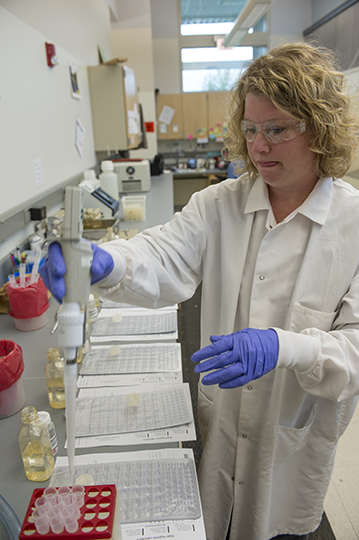
JESSICA ELLIOTT: jessica-elliott@uiowa.edu
BRIAN WELS: brian-wels@uiowa.edu
Inorganic elements are minerals and metals found
in the environment, some of which are harmful
to human and animal health, even with minimal
exposure. Some inorganic compounds occur
naturally in the environment, such as metals found
in soil and rock, while others are present due to
human activities, such as crop fertilization or the
use of lead in paint prior to 1978. Detection of
these elements is important because mitigation
techniques can then be implemented to reduce
potentially dangerous exposure.
Testing is conducted for state agencies, public
water supplies, county public health departments,
businesses and private citizens. The Inorganic
Chemistry section can determine the presence of
inorganic elements in air, groundwater, drinking
water, surface water, wastewater, soil, sludge,
vegetation and food. Tests conducted on these
matrices can determine the presence of arsenic,
cadmium, mercury, lead and many other metals in
the environment. Samples from public and private
(well) water supplies are analyzed for levels of
nitrate, nitrite, total coliform and E.coli bacteria.
Testing for lead in dust, paint, soil, pottery and food
products is performed to help identify sources of
lead exposure.
Inorganic Chemistry processes samples with short
holding times (within 48 hours of collection) to determine
the presence and levels of orthophosphate, nitrite and
nitrate. Determination of levels of oil and grease in waste
streams is determined at the Coralville laboratory.


Other Units in Environmental Health
The Office of the Director consists of 10 key functional units that enable the State Hygienic Laboratory to achieve its statutory charge set forth in the Iowa Administrative Code.
The primary mission of the Disease Control Division is to test human specimens, food and water for diseases of public health significance to protect the citizens of Iowa.
The Environmental Health Division monitors drinking water, wastewater, air, soil and food for contaminants of potential environmental and public health concern.
The Division of Administration and Finance is responsible for the management of the business practices, all Hygienic Laboratory facilities, and pre/post testing support.
